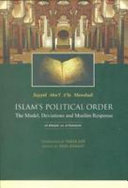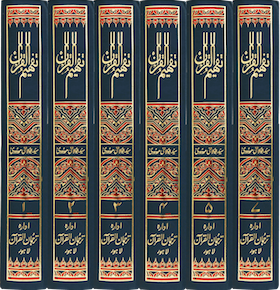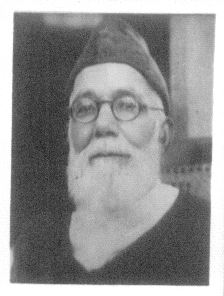
Jamaat-e-Islami Pakistan (JIP), is a Pakistani Islamist political party. It is the Pakistani successor to Jamaat-e-Islami, which was founded in colonial India in 1941. JIP is a "vanguard party", whose members are intended to be leaders spreading party beliefs and influence. Supporters not thought qualified to be members may become "affiliates", and beneath them are "sympathizers". The party leader is called an "ameer". Although, it does not have a large popular following, the party is quite influential and considered one of the major Islamic movements in Pakistan, along with Deobandi and Barelvi.
Khurshīd AhmadPhD, DSc, NI, is a Pakistani economist, philosopher, politician, and an Islamic activist who helped to develop Islamic economic jurisprudence as an academic discipline and one of the co-founders of The Islamic Foundation in Leicester, UK.

Israr Ahmad was a Pakistani Islamic scholar, orator and theologian. He developed a following in Pakistan and the rest of South Asia but also among some South Asian Muslims in the Middle East, Western Europe, and North America.

Islamic Way of Life is a book written by prominent Muslim Sayyid Abul Ala Maududi in Lahore, 1948.

Khilafat o Mulukiyat is a 1966 book by Abul Ala Maududi as a refutation of the book, The Caliphate of Mu'awiyah and Yazid by Pakistani scholar Mahmood Ahmad Abbasi.
The Islamic Foundation is Jamaat-e-Islami's research and publishing house in the United Kingdom. It was established in 1973 by two high-ranking Pakistani activists of Jamaat-e-Islami, Khurshid Ahmad and Khurram Murad. Its objectives are to research into the implementation of Islam in the modern world, to project the image of Islam in Britain and Europe, and to meet the educational needs of Muslims.
Human Rights in Islam is a 1976 book written by Sayyid Abul Ala Maududi, the founder of Jamaat-e-Islami.
Qadiyani Problem is a 1953 book written by Pakistani scholar Abul A'la Mawdudi. "Qadiyani" is a slur used to attack members of the Ahmadiyya movement.

Amin Ahsan Islahi, was a Pakistani Muslim scholar best known for his Urdu exegesis of the Quran, Tadabbur-i-Quran, which he based on Hamiduddin Farahi's, idea of thematic and structural coherence in the Qur'an.

Abul A'la al-Maududi was an Islamic scholar, Islamist ideologue, Muslim philosopher, jurist, historian, journalist, activist, and scholar active in British India and later, following the partition, in Pakistan. Described by Wilfred Cantwell Smith as "the most systematic thinker of modern Islam", his numerous works, which "covered a range of disciplines such as Qur'anic exegesis, hadith, law, philosophy, and history", were written in Urdu, but then translated into English, Arabic, Hindi, Bengali, Telugu, Tamil, Kannada, Burmese, Malayalam and many other languages. He sought to revive Islam, and to propagate what he understood to be "true Islam". He believed that Islam was essential for politics and that it was necessary to institute sharia and preserve Islamic culture similarly as to that during the reign of the Rashidun Caliphs and abandon immorality, from what he viewed as the evils of secularism, nationalism and socialism, which he understood to be the influence of Western imperialism.

Tafhim-ul-Quran is a 6-volume translation and commentary of the Qur'an by the Pakistani Islamist ideologue and activist Syed Abul Ala Maududi. Maududi began writing the book in 1942 and completed it in 1972.

Muḥammad Manz̤oor Nomānī was an Indian Islamic scholar. Prominent among his written works are Maariful Hadith, Islam Kya Hai?, and Khomeini and the Iranian Revolution.

Islamic Publishing House is a leading publisher of Islamic literature in the state of Kerala, India. It was founded in 1945 as the official publication division of Jama’at-e-Islami Hind, Kerala chapter. Its headquarters is in Kozhikode, Kerala.

Bangladesh Jamaat-e-Islami, previously known as Jamaat-e-Islami Bangladesh, is a Bangladeshi Islamist political party; it is the largest Islamist political party in Bangladesh.

Chaudhry Niaz Ali Khan was a civil engineer, agriculturalist, and philanthropist who founded "Dar ul Islam Movement" and "Dar ul Islam Trust" in South Asia and "Dar ul Islam Trust" Institutes in Pathankot and Jauharabad. Besides a philanthropist, Niaz was also a civil servant, and a landowner. He was the member of All-India Muslim League and a participant of the Pakistan Movement with the ultimate aim of creating the Muslim-majority areas of British India.
Maryam Jameelah was an American-Pakistani author of over thirty books on Islamic culture and history and a female voice for orthodox Islam, known for her writings about the West. Born Margret Marcus in New York City to a non-observant Jewish family, she explored Judaism and other religions during her teens before converting to Islam in 1961 and emigrating to Pakistan. She was married to and had five children with Muhammad Yusuf Khan, a leader in the Jamaat-e-Islami Pakistan political party, and resided in the city of Lahore.
Jamaat-e-Islami is an Islamist fundamentalist movement founded in 1941 in British India by the Islamist author, theorist, and socio-political philosopher, Syed Abul Ala Maududi, who was inspired by the Muslim Brotherhood. It is considered one of the most influential Islamist organisations, and was the first to develop an ideology based on the modern revolutionary conception of Islam. Its founding branch in Pakistan is the nation's largest fundamentalist party.

Mansoorah is a neighborhood located within union council 117 (Hanjarwal) on Multan Road, Lahore, Punjab, Pakistan.
Abdul Ghafoor Ahmed was a Pakistani politician who represented Jamaat-e-Islami in National Assembly and Senate of Pakistan in 1970 till 1977. He was a signatory and committee member who prepared the draft of the 1973 Constitution of Pakistan.
Mawlana Abdur Rahim was a Bangladeshi Islamic scholar, South Asian politician and the first promoter of Jamaat-e-Islami Bangladesh.












